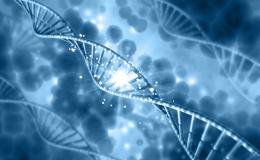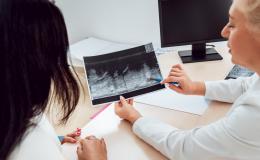What Are the Signs and Symptoms of Testicular Cancer?
April 1, 2021
While testicular cancer isn’t common (only about 1 in every 250 males will develop the disease), the incidence of this cancer has been steadily increasing in the U.S. and other countries for decades.

While testicular cancer isn’t common (only about 1 in every 250 males will develop the disease), the incidence of this cancer has been steadily increasing in the U.S. and other countries for decades. This increase has slowed in recent years, but experts still haven’t identified a reason for the rise in cases.1 In recognition of Testicular Cancer Awareness Month this April, we highlight the signs, symptoms and types of testicular cancer and what you should do if you or someone you care about is experiencing symptoms consistent with the disease.
Cancers, including testicular cancer, occur when a normal cell becomes cancerous and divides uncontrollably. Cells can become cancerous when genes responsible for controlling cell growth and division acquire enough mutations, or changes in gene “spelling,” over time to alter the normal function of these genes. Cancer occurs when enough genes are sufficiently mutated for a cell to lose control of cell division.
Testicular cancer, as the name implies, is cancer of the testicles (or testes). While the cancer itself is rare, it is the most frequent cancer of U.S. males between the ages of 15 and 35 years of age.2 Fortunately, the disease is highly treatable, even if the cancer has spread, and only one testicle is typically affected. Symptoms of testicular cancer can include:
- A lump or growth in either testicle
- A heavy sensation in the scrotum
- Rapid fluid accumulation in the scrotum
- Pain in the groin, testicle, scrotum or abdomen
- Breast enlargement or tenderness
- Back pain
If you or someone you care about is experiencing symptoms consistent with testicular cancer, schedule an appointment with a physician for evaluation.
Testicular cancers are divided into two types: seminomas and nonseminomas. Seminomas tend to occur in older populations and are generally less aggressive cancers. Nonseminomas, on the other hand, develop at an earlier age and grow and spread more rapidly than seminomas. Physicians typically use ultrasounds, blood tests and/or surgery to accurately diagnose both the type and stage of a testicular cancer.
In some individuals, testicular and other forms of cancer can be hereditary, or passed from an affected parent to their child. Hereditary cancers run in families and are caused by gene mutations that typically affect the function or expression of genes involved in cell growth and division. A parent that harbors a hereditary cancer gene mutation usually has a 50% chance of passing the mutation on to their child. These mutations do not guarantee that an affected person will develop cancer, but they do greatly increase the risk of developing the disease. Hereditary testicular cancers typically account for about three percent of cancer diagnoses,3 while nonhereditary diagnoses are considered sporadic cancers.
Despite the fact that testicular cancers are highly treatable, a cancer prognosis in general is tightly correlated with the stage at which the disease is diagnosed: as a rule, the earlier the stage at diagnosis, the better the prognosis. Regular self- and physical exams can help detect testicular cancers at an early stage, and a physician can assess your hereditary risk by understanding your family history of the disease. Kailos Genetics offers the ExpedioTM Hereditary Cancer Screening test to assess genetic mutations in 33 genes associated with hereditary cancer syndromes to help patients, families and their physicians better understand their unique cancer risks. To learn more about ExpedioTM, click here, or contact us with any questions you may have regarding genetic screenings.




